- Home
- Phacilitate 2019 and World Stem Cell Summit
Phacilitate 2019 and World Stem Cell Summit
Published on 29 January 2019
Scott Deeter
In January, there’s no better place to be than Miami, FL. While we were excited to escape the cold winter, it was all business for InVitria during Phacilitate 2019 and the Regenerative Medicine Foundation’s World Stem Cell Summit. This year, there was an excitement in the air due to the significant increase in the number of cell therapies in the clinical pipeline. With some cell therapies already being approved, many product innovators at the conference were beginning to focus toward commercial scale-up, bringing new learnings and innovations to the industry. Overall, this event was a big success for our cell culture media team since it was packed with great content, speakers and many partnering meetings.
A Burgeoning Clinical Pipeline
The main highlight of the conference was the number of patients being treated with cell therapies that have been approved or are now in clinical trials. Janet Lambert, CEO of Alliance for Regenerative Medicine gave the State of the Industry Report which noted that products in the clinical pipeline are enrolling 59,575 patients across 1,028 clinical trials. Of these trials, 362 are for gene therapies and 625 are for cell therapies.
Currently, Oncology represents 58% of all clinical trials for cell and gene therapies. This suggests that the many years and billions of dollars of investment in product development are finally leading to products moving through the clinical pipeline and making their way to patients.
Approvals Drive Innovation in Cell Therapy Manufacturing
 Up until now, the goal for cell and gene therapies had been getting through clinical trials. Now that the first products have been approved, the variability and productivity of cell processing has become a focus for many. These experts are also interested in new technologies that can help improve quality, cell expansion performance and standardization as they expand into new clinical indications.
Up until now, the goal for cell and gene therapies had been getting through clinical trials. Now that the first products have been approved, the variability and productivity of cell processing has become a focus for many. These experts are also interested in new technologies that can help improve quality, cell expansion performance and standardization as they expand into new clinical indications.
One of the main events at Phacilitate was a panel discussion with Randy Schweickart, Juno Therapeutics; Steve Goodman, Bluebird bio; and Brian Hampson, Hitachi Chemical Advanced Therapeutics Solutions, LLC. The discussion highlighted the challenge of working with incoming cells from cancer patients that have varying quality and ensuring a sufficient number of potent target cells after expansion.
Currently, there are many innovations underway including methods of qualifying inbound raw materials used in manufacturing and designing processes that will reduce variability during expansion. Using large datasets these developers are building manufacturing data systems to help them evolve manufacturing innovation.
Impressive Turnouts Bring Resounding Success
This year’s event was bigger than ever with 1,800 attendees and more than 150 exhibitors. Exhibitor booths, partnering tables and meeting rooms filled every corner of the Hyatt Miami Convention Center. At the event, major cell processing equipment vendors joined the consumable and service providers to make a well-rounded audience for the leaders and panels speaking during the conference.
For InVitria, the conference was a resounding success and reached a definitive critical mass this year. The partnering system worked flawlessly allowing us to connect with our current and prospective customers during the three-day event to discuss the benefits of custom media for their manufacturing processes.
Overall it is an exciting time to be in the cell and gene therapy industry and we can’t wait to see what next year’s conference has in store for our partners!
